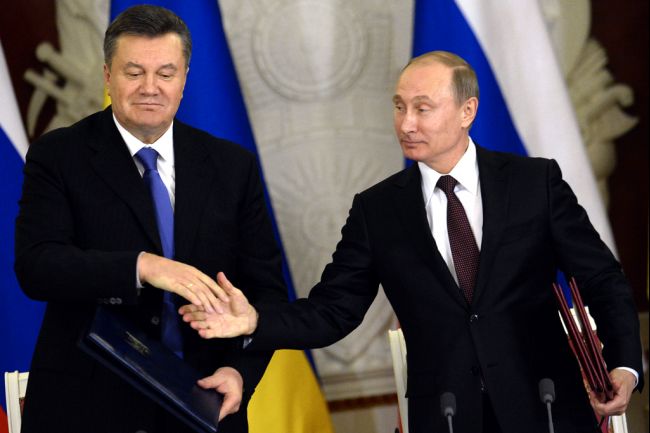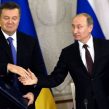
Russia Begins Collecting Its Ukrainian Gas Bill
Publication: Eurasia Daily Monitor Volume: 11 Issue: 3
By:

Although demonstrators still occupy the Maidan in central Kyiv and none of Ukraine’s fundamental issues that precipitated the crisis in late 2013 have been resolved, it is clear that the Russian “transfusion” of support for Ukrainian bonds and lower natural gas prices has given President Viktor Yanukovych’s government a respite. In this interval, it still is not fully clear what Ukraine’s obligations will be to Russia in return for this support. Nevertheless, one can observe the beginnings of the outline of what Ukraine now “owes” Russia. It should be remembered that as part of the Russian solution Ukrainian Prime Minister Mykola Azarov stated that Russia devised a plan to restore “full-fledged” ties between Moscow and Kyiv (Interfax-Ukraine, December 7, 2013).
This does not include the question of Ukraine and the Russian-led Customs Union—indeed, Moscow seems hardly willing to admit an economic basket case the size of Ukraine into the union at present given the economic disaster it would portend and the political explosion that would surely erupt. But full-fledged ties clearly point to modifications, probably in Russia’s favor, in gas, defense issues and industry, as well as other economic sectors. Thus, Russia wrote into the agreement important clauses on the maintenance and re-equipment of the Black Sea Fleet and construction of a bridge over the Kerch Strait between Ukraine’s Crimea and Russia’s Krasnodar Krai (Vedomosti Online, December 19, 2013). What this means is that Russia is strengthening its hold on Crimea and adding infrastructure so that this region remains hostage to bilateral relations. And should Kyiv falter in its obligations or become sufficiently weak, Crimea will likely revert de jure to Russia—even though it is already de facto largely controlled by Russia.
Importantly, both sides differ in their opinion of Ukraine’s “assets.” President Yanukovych insists that his country’s gas transport system remains an important commodity, while Russian President Vladimir Putin said its value is approaching minimal levels (Nezavisimaya Gazeta Online, December 20, 2013). This may be a tactic to drive down the price of Ukraine’s pipeline network. But it is unlikely that Moscow has given up its dream of acquiring that network even though it has begun work on the South Stream gas pipeline, which avoids Ukrainian territory entirely. The political payoff of controlling Ukraine is too large for the Kremlin to renounce; and second, too many Russian elites’ private interests are embroiled in Ukraine’s gas issues for anyone to walk away empty-handed.
But since Yanukovych has shown no sign of reforming Ukraine’s wasteful energy policies, which make it essentially an addict to Russian gas, it is likely that the Russian price reduction will only encourage further dependency on Kyiv’s Russian pusher. Moreover, even though Ukraine’s Vice Prime Minister Yuriy Boyko says the country’s gas problem is now solved until 2019 and that Ukraine will keep reducing its gas purchases from Russia, in fact the notorious take-or-pay clauses of the 2009 contract remain in force. This arrangement ensures that these problems will continue to roil the waters of Russo-Ukrainian relations (ITAR-TASS, December 23, 2013; Kommersant-Ukraine, December 19, 2013). Ukraine’s “addiction” will likely persist because the Russian price relief leads to a rate that is evidently lower than what Ukraine has been paying for gas purchases from Europe (Kommersant-Ukraine, December 18, 2013).
And Ukraine’s respite will probably be short-lived; Gazprom will be able to revise the price on a quarterly basis, and the Russian funding for state bonds to Ukraine will come only in individual tranches. Ironically, Ukraine probably did not need to seek a Russian gas bailout in return for turning away from the Europe. Gazprom, after all, quietly reduced its prices in December for Moldova, which had resisted Russian pressure and initialed an Association Agreement with the European Union at the November summit in Vilnius (infotag.md, December 26, 2013).
Russia’s offer of $15 billion from its National Welfare Fund—set against the Ukrainian bonds and reduction in gas prices—will also lead to greater Russian leverage over the Ukrainian economy. The Russian funds for bonds already underwrite the Ukrainian deficit and allow Kyiv to avoid reforming its domestic gas usage and to maintain an artificially high exchange rate than is warranted. In other words, any time Russia turns off support, the hryvnia will plummet, raising the specter of devaluation (Kommersant-Ukraine, December 19, 2013). Moreover, Ukraine’s refusal to reform means continuing high risks for its financial sector (Kommersant-Ukraine, December 18, 2013).
Nonetheless, Ukraine is already paying back its obligations. It will supply Russia with Zenit carrier rockets at a price yet to be agreed upon (Interfax-Ukraine, December 28, 2013). It will also make natural gas tankers for Russian use in the Arctic (Interfax, December 21, 2013). Furthermore, the Kyiv Post reported that Ukraine recently repaid a $750 million loan issued by Russia’s VTB Capital PLC and Sberbank. Essentially, this means that Ukraine used the first tranche of the Russian fiduciary support for its bonds to pay off debts. And the figures on Ukrainian borrowing suggest that Russian funds will be used to pay off other debts rather than go to productive investment. Thus, debt is turning into debt not equity, and Russia is the creditor—hardly a sign of future success or independence for Ukraine, let alone reform. Indeed, Ukraine borrowed 23.98 billion hryvnia ($3 billion) from abroad in 2013. This amount in US dollars is equivalent to the funding that Russia granted by way of purchasing Ukrainian Eurobonds with National Welfare Fund money (Kyiv Post, December 30, 2013)
Arguably then, the above-described package deal represents a gradual Russian leveraged buyout of Ukraine, which is liable to wake up one morning soon and find that its independence and territory have been gradually sold off to Russia. One can already see this happening in the gas, finance, and defense sectors. But should anyone profess to be surprised at these results?




